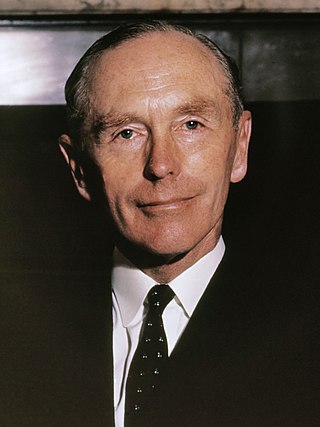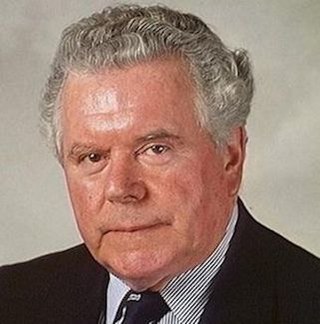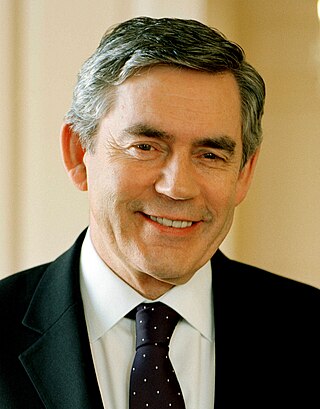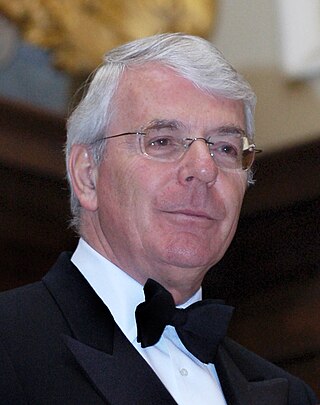
The 1964 Prime Minister's Resignation Honours were officially announced in the London Gazette of 27 November 1964 and marked the October 1964 electoral defeat of the Prime Minister, Sir Alec Douglas-Home. [1] [2]

The 1964 Prime Minister's Resignation Honours were officially announced in the London Gazette of 27 November 1964 and marked the October 1964 electoral defeat of the Prime Minister, Sir Alec Douglas-Home. [1] [2]

Alexander Frederick Douglas-Home, Baron Home of the Hirsel,, styled as Lord Dunglass between 1918 and 1951 and the Earl of Home from 1951 until 1963, was a British statesman and Conservative politician who served as Prime Minister of the United Kingdom from 1963 to 1964. He is notable for being the last prime minister to hold office while being a member of the House of Lords, before renouncing his peerage and taking up a seat in the House of Commons for the remainder of his premiership. His reputation, however, rests more on his two stints as Foreign Secretary than on his brief premiership.

The 1964 United Kingdom general election was held on Thursday 15 October 1964. It resulted in the Conservatives, led by incumbent Prime Minister Alec Douglas-Home, narrowly losing to the Labour Party, led by Harold Wilson; Labour secured a parliamentary majority of four seats and ended its thirteen years in opposition since the 1951 election. Wilson became the youngest Prime Minister since Lord Rosebery in 1894. To date, this is also the most narrow majority obtained in the House of Commons, with just one seat clearing Labour for a majority government.
In the United Kingdom there are at least six Lords Commissioners of His Majesty's Treasury, serving as a commission for the ancient office of Treasurer of the Exchequer. The board consists of the First Lord of the Treasury, the Second Lord of the Treasury, and four or more junior lords acting as whips in the House of Commons to whom this title is usually applied.

The Conservative government of the United Kingdom that began in 1957 and ended in 1964 consisted of three ministries: the first Macmillan ministry, second Macmillan ministry, and then the Douglas-Home ministry. They were respectively led by Harold Macmillan and Sir Alec Douglas-Home, who were appointed by Queen Elizabeth II.

Sir Dudley Gordon Smith was a British Conservative politician who served as a junior minister under Edward Heath. He was a Member of Parliament for a total of 35 years, latterly for Warwick and Leamington, which he represented for almost 30 years before he lost his seat in the Labour landslide in the 1997 general election.

Sir Francis Fenwick Pearson, 1st Baronet, was a British colonial administrator, farmer and politician.

The 1997 Prime Minister's Resignation Honours were officially announced in two supplements to The London Gazette of 1 August 1997 and marked the May 1997 resignation of the Prime Minister, John Major.

Margaret Thatcher was Prime Minister of the United Kingdom from 4 May 1979 to 28 November 1990, during which time she led a Conservative majority government. She was the first woman to hold that office. During her premiership, Thatcher moved to liberalise the British economy through deregulation, privatisation, and the promotion of entrepreneurialism.

The 2010 Dissolution Honours List was issued on 28 May 2010 at the advice of the outgoing Prime Minister, Gordon Brown. The list was gazetted on 15 June.
The 1966 Dissolution Honours List was issued on 19 May 1966 following the dissolution of the United Kingdom parliament in preparation for a general election.

The 1992 Dissolution Honours List was gazetted on 5 June 1992 following the advice of the Prime Minister, John Major.
Sir Timothy James Bligh, KBE, DSO, DSC* was a British Royal Navy officer, civil servant and business executive, who served as Principal Private Secretary to two successive prime ministers; Harold Macmillan and Sir Alec Douglas-Home.

The 1997 Dissolution Honours List was gazetted on 18 April 1997 following the advice of the outgoing Prime Minister, John Major. The only honours in this list were 21 life peerages.

The 1983 Dissolution Honours List was gazetted on 21 July 1983 following the advice of the Prime Minister, Margaret Thatcher.

The 1987 Dissolution Honours List was gazetted on 30 July 1987 following the advice of the Prime Minister, Margaret Thatcher.
The February 1974 Dissolution Honours List was issued on 2 April 1974 following the dissolution of the United Kingdom parliament in preparation for a general election.
The 1959 Dissolution Honours List was issued on 19 September 1959 to mark the dissolution of the United Kingdom parliament prior to the 1959 general election.
The 1964 Dissolution Honours were officially announced on 27 November 1964 and marked the dissolution of parliament following the 1964 General Election.
The 1979 Dissolution Honours List was issued in June 1979 following the general election of that year.
John Dudley Groves CB OBE was a British former journalist and civil servant who served as Downing Street Press Secretary under Alec Douglas-Home from 1963 to 1964.